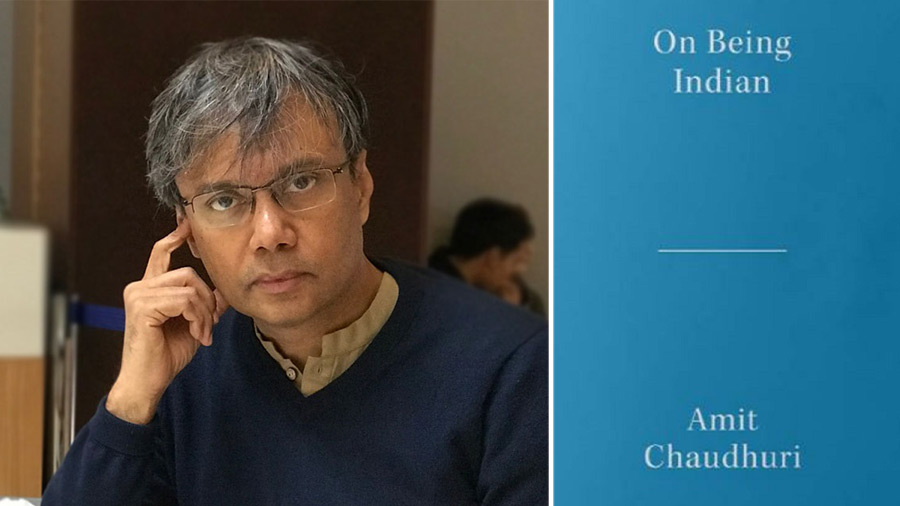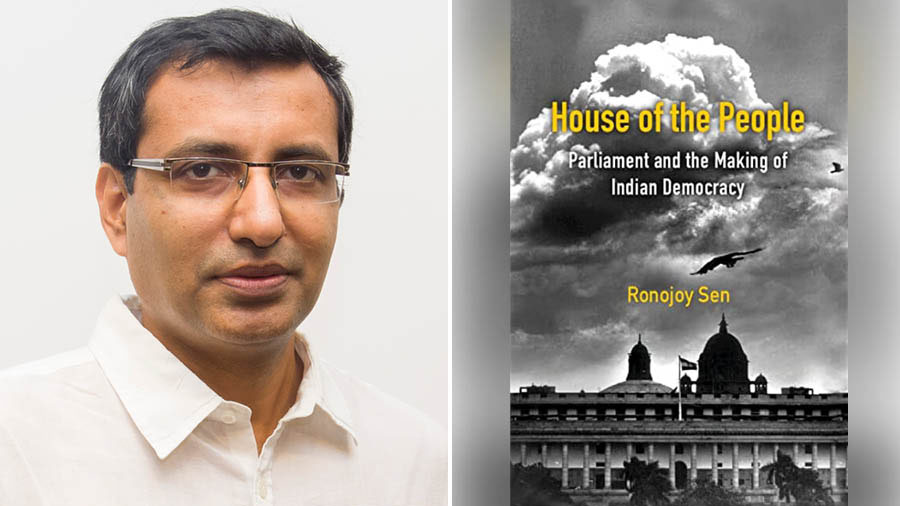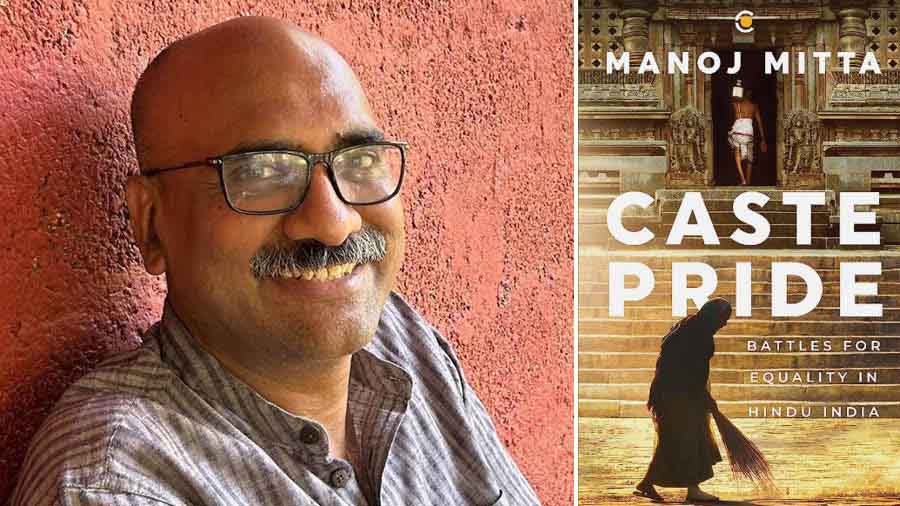Who is an Indian? Who is an intellectual? Despite the vastly different premises of both these questions, the process of answering them can be similarly slippery. The shifting sands of context, culture and commerce have made it challenging to pin down Indianness and intellectualism, two threads that dovetail frequently in Amit Chaudhuri’s new book, On Being Indian: The Organic Intellectual, Mystical Poetry and Lineages of Indian Rationalism (published by Westland Books).
Originally a talk delivered at Delhi’s Jamia Millia Islamia University in February 2020, and then published as an essay in ‘Social Research Quarterly’ the following year, On Being Indian is a part of the Literary Activism project, which began with symposiums and discussions in December 2014. Since then, it has been supported by the Centre for the Creative and the Critical, Ashoka University, found a digital presence as a website (here) and brought out Arvind Krishna Mehrotra’s poetry collection, Book of Rahim, as the first in its Literary Activism imprint. Chaudhuri’s book, though not initially planned to be so, is the next in the Literary Activism series, which attempts to ensure “more writerly intervention in the process of what gets published”.
Speaking to My Kolkata over video call, Chaudhuri shared his insights on the key ideas in his book alongside delving into the importance of the anti-CAA protests. Edited excerpts from the conversation follow.
‘Literature’s own idea of significance isn’t pre-fabricated, it’s open to questions’
My Kolkata: What is literary activism? And why do we need it today?
Amit Chaudhuri: The nature of my book, which has some political content, might confuse one into thinking that literary activism is a form of activism in the conventional sense. But it’s not meant to be political activism through literature. It was conceptualised as a reaffirmation, especially at the time of globalisation, of the puzzling and difficult-to-pin-down nature of the literary. Something that won’t be contained by the categories of the market or the parameters of academia.
There’s a necessity for creating a space to do with the idiosyncratic, even strange (in the sense of Jacques Derrida referring to literature as a “strange institution”) character of literature. It’s never talking about what we think it’s talking about. It estranges us from what we think we know and what we see around us. Both the market and academia largely promote literature opportunistically through the prism of themes and rubrics so that it becomes an ancillary of some other form of knowledge or study, whether that’s the social sciences or history. And theme is central to commercial value (saleability); you can’t market a work that has no overt theme. But literature’s own idea of significance isn’t pre-fabricated, it’s open to question and constant revision. It assigns it in a way that contradicts the way our education and our milieu have decided what’s significant or important.
Let me give you an example. Walter Benjamin, in his essay, “The Return of the Flaneur” (1929), talks about why the flaneur (a man who observes society as he wanders around the city) could only have occurred in Paris and not in Rome. The great historical monuments of Rome bore the flaneur and are “so much junk” to him, says Benjamin; he’s more interested in a Paris of the weathered door knob or a crack in a tile. What’s seemingly insignificant and ephemeral becomes enduring to the flaneur while what is “historic” becomes junk. Which is why I say in my introduction to Arun Kolatkar’s Jejuri that “history” – the domain of the historical novel and national allegory – is “junk to him; on the other hand, junk is history” (Kolatkar is always writing about derelict objects). This is an instance of literature’s rather peculiar attribution of significance.
Differentiating the traditional intellectual from the organic intellectual
MK: One of the most fascinating parts of your book deals with the differences between the traditional intellectual and the organic intellectual. Who are they and can one not be both?
AC: I encountered the term “organic intellectual” through a final-year dissertation my daughter was working on. When I looked into the way the term had been used or elaborated upon by [Antonio] Gramsci, I didn’t find a huge amount except that the organic intellectual is someone who works within the system, possibly a blue-collar or a white-collar worker. A traditional intellectual is someone who belongs to an academic, or rather, an intellectual class. Membership of this class subsumes or transcends other forms of identities or origins. The organic intellectual doesn’t belong to this ‘intellectual’ class. So, whenever we’re looking at pronouncements on the Constitution, liberalism or fundamentalism, we’re looking towards the traditional intellectuals. We’re not looking at our neighbour, who’s supposed to be a part of the mass respectful of, or resisting, these ideas. Their intellectual history isn’t something we’re looking at. What’s the intellectual history of the organic intellectual then: the person who works within the system as a farmer, airline pilot, receptionist, or housewife? Of Neeraj Chopra’s mother, Saroj Devi, who makes a courageous intervention? Or of Zomato talking about diversity? Or Saket Gokhale’s RTI about the “tukde-tukde gang”? Engaging with that history is about moving beyond the conventional sources of education and liberal ethos into other forms of thought that are in the air. It’s part of a language we don’t know enough about.
MK: With the blurring of lines between intellectualism and fame or celebrity — everyone from an influencer to an actor to an athlete seems to be an intellectual these days, urged to comment on all kinds of issues — is the concept of the organic intellectual getting democratised or diluted?
AC: That’s a democratisation of the traditional intellectual. The lists of intellectuals that are brought out nowadays contain more celebrities than intellectuals, figures whose intellectual contribution may be negligible, or which we don’t really know much about. They’re the ones who mostly take up the positions of conventional activists, all of which is good and fine. We need them, too. But nobody can really identify an organic intellectual as being an organic intellectual until they emerge spontaneously at a certain moment, in a specific situation. This is because organic intellectuals respond to particular events or situations as they take place (they are working people, after all, not professional thinkers) — situations through which questions to do with humanity and freedom may be played out with great urgency — whereas the traditional intellectuals respond to larger categories of issues.
‘The West came to mean something else after 9/11’

What we perceive to be Western nowadays was endorsed as part of a fundamental necessity of Western values after 9/11, explains Chaudhuri TT Archives
MK: What do you make of the fact that Indian intellectuals, for the most part, still borrow Western intellectual frameworks to understand India? For example, the Western concept of the political left and the right hardly apply to the more layered political spectrum of India. Even populism, so often used to describe modern Indian politics, seems like a reductionist label. Do we need more indigenous frameworks to better understand India?
AC: Yes, Western frameworks can’t be seen as universal partly because that universalisation is an artificial construct that has its own history. The “West” came to mean something else after 9/11, when there was a sudden rehabilitation of even the more unpleasant sides of Western history, including colonialism and Empire. This happened as part of the endorsement of the fundamental necessity of Western values, which were made synonymous with democracy, peace, etc.
The response to this is not necessarily to turn to indigenisation. The answer is to realise that, firstly, nothing is produced without an interface. Secondly, there’s an argument or reason behind these interfaces, involving alliances and articulations among different cultures. There are no unitary entities in culture. One way to handle this, which literary activism also tries to do, is not to take words as a given. Instead, it is to try and open up their meanings by studying their history.
The relationship between religion and reason
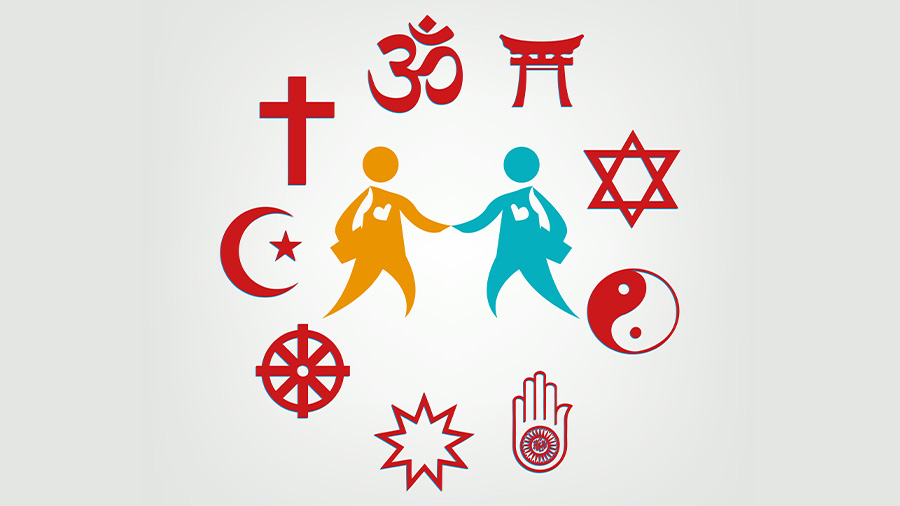
Religion and reason can both stem from rationality, argues Chaudhuri TT Archives
MK: Another aspect where the West has influenced our ideas is in the realm of religion, which it often divorces from rationality. But to quote from your book, “Religion [in the Indian tradition] uses reason to refute bogus religion”. Could you explain this?
AC: Many of us are educated in a Western system that tells us that reason is located in a way of thinking called rationality. That rationality is the foundation of science and that science is related to objectivity, where you don’t let your subjective emotions decide what reality is. This is the way we understand reason, which is a part of the legacy of the Enlightenment. This means that we start looking at all other things like religion, myth, literature and the arts as experiences and expressions that are either emotional or subjective or even irrational. When we’ve had enough of rationality, we can turn to the irrational, or we can let the irrational, sometimes, be a critique of the rational.
But within religion, at least in the way it’s conceived in India, there’s so much reasoning. That reasoning isn’t directed towards proving that empirical reality is the only reality and that any other reality that wants to contest its supremacy must prove itself through the same empirical test of validity. It doesn’t mean that if we can’t see it or feel it, it’s not valid, it’s not real. It seems that the experience of god and proving whether god exists or not wasn’t uppermost in the minds of radical thinkers or poets in India. What seems to preoccupy them is the truth and immediacy – and the nature – of adoration. The person who is saying I’m a lover of god is also sometimes performing that love and legitimising themselves through that performance. There’s a lot of reasoning in religion that’s engaged in refuting bogus adoration, and using empirical means to rebut bogus legitimacy through religion and caste — so Lalon Fakir says in Sob Loke Koy Lalon ki Jaat: “People ask what caste Lalon belongs to in this world/ Lalon replies, I still haven’t seen what caste looks like with my eyes.” This is empirical reasoning used for spiritual means to reject the bogus, self-legitimising aspects of religion: I haven’t actually seen what caste looks like; so how can it exist? The rational exists in our milieu within our most important religious texts or poets. For example, the Bhagavad Gita, in two separate passages, distances itself from the Vedas. That’s where it goes from being a religious text to a critical or intellectual one. I don’t think this happens in texts from any other religion; certainly, no instance comes readily to mind.
‘The anti-CAA protests showed us a non-professionalised domain of reasoning and courage’
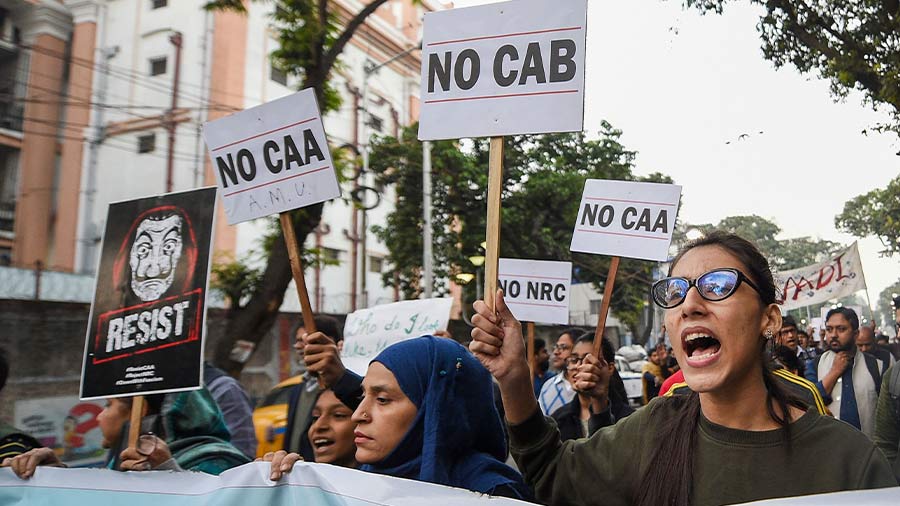
The anti-CAA protests showed us the possibility of a different kind of thinking, believes Chaudhuri TT Archives
MK: In the book, you write admiringly of the anti-CAA protests in 2019-20, which you also participated in yourself. Do you feel that they were an outlier in terms of democratic dissent in India? Or that they could be a trendsetter for protests to come?
AC: All great movements are anomalies in the sense that they make you think again. They don’t need to happen again – we just need to know that something was opened up by the fact that they happened. The anti-CAA protests showed us a non-professionalised domain of reasoning and courage, which goes beyond individual activists to include ordinary people who can’t help making interventions as they respond to their everyday life. It’s important we recognise this and locate the history of their response.
‘The definition of Indianness gives us access to all kinds of contradictory possibilities that aren’t accessible only through national identity’
MK: You describe your essay, in part, as an “impassioned expression of, and meditation on, what it means to ‘be Indian’”. Can you tell us the key traits that make someone an Indian?
AC: There are many ways to define Indianness. I’ll concentrate on its resonances for both Indians and non-Indians as an English word that begins to become definitive at a certain point in history. One way is to say that however exclusionary a category it is, Indianness, as it emerged in the early 19th century, contributed in an important way to the history of humanism. To be Indian is to be human and to participate in, and shape, the history of humanism. Again, however exclusionary a category the “human” itself is, this is a radical innovation. In the 19th century, it means that I, as an Indian, can oppose you because you’re my coloniser, but I can still read your books, appreciate your Shakespeare or Wordsworth, and possibly sometimes understand them better than you do. Who am I as an Indian? I could be a Muslim. I could be a Hindu. I could be a lower-caste Hindu. I could be Toru Dutt, Ambedkar, Gandhi, Tagore, Ghalib, or Ismat Chughtai. I’m also your uncle or aunt. The definition of Indianness gives us access to all kinds of contradictory possibilities that aren’t accessible only through national identity. They were partly made possible through a humanist idea of the self. If it were a purely nationalistic identity, then I’d have to reject everything I’m not as being the other. That humanist identity gave us a great deal of innovative leeway in terms of how we dealt with a variety of inheritances.
‘I’m worried about the fact that many Indians seem to take democracy casually’
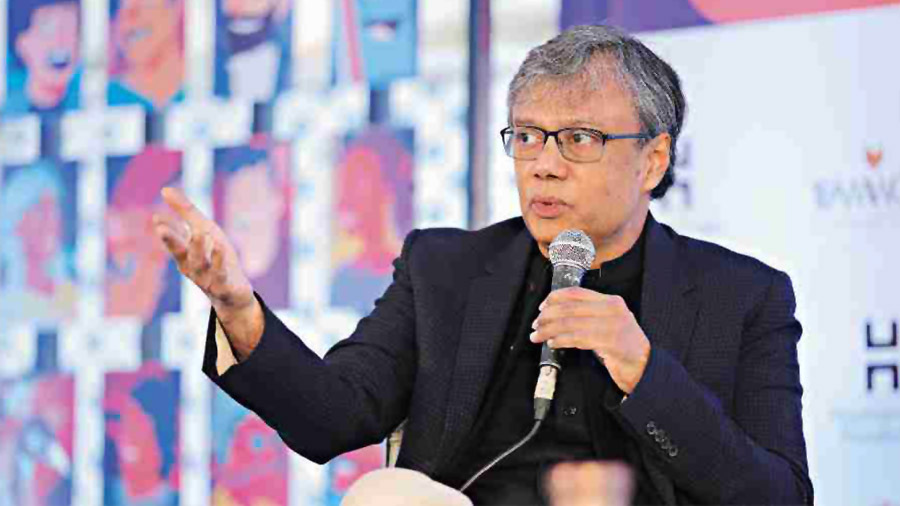
Chaudhuri thinks that democratic institutions and the institution of democracy itself are in grave danger in India TT Archives
MK: Lastly, what about India today worries you the most? And what gives you hope?
AC: The biggest reason I’m worried about India is about its future as a democratic country. Its democratic institutions and the institution of democracy itself are in grave danger. I’m also worried about the fact that many Indians seem to take democracy casually while being part of a country in which they’ve really benefited from democracy, even as many of them want to migrate to countries that are more democratic for purely economic reasons — many of them seem to want more restrictive governance at home, and more freedom abroad.
It’s more difficult to say what I’m hopeful about. It’s one of the worst times I’ve experienced, not just politically, but in terms of the market, too. For hope, you need not just political openness or political freedom, but other kinds of openness that include space to be useless, space to be indifferent, space to love and to love uselessly. Once that goes away, and goes away without a comment from the custodians who are busy speaking about defending our freedom of expression, we lose our largesse. The largesse our parents and grandparents had, to do with the pursuit of things for love without any instrumental reason. Once that space goes away, one begins to lose hope… There’s not much to be actually cheerful about.
